The House of Hope, which is part of the House Light on the Hill, both which are part of the Fraternity – International Humanitarian Federation, hosts the “Experiential Course on Attending Animals Attendance” for private caregivers and volunteers of non-governmental organizations. The course is offered In the town of Carmo da Cachoeira, Minas Gerais, Brazil.
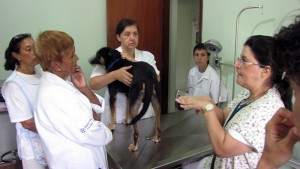 On the treatment table, a medium-sized animal is supported by its caregiver while it is examined by a veterinarian. Surrounding them are caregivers and volunteers of non-governmental organizations (NGO’s) from some cities in the region. The name of this dog is Skipper, one year old, who arrived for care with difficulty in breathing, diahrrea and also some difficulty in lying down. After examining the X-ray, the veterinarian determined that the animal suffered from a diaphragmatic hernia with a loop of the bowel was angled towards the thorax. For this reason, a surgery is decided for the following week at the House of Hope to correct the position of the loops.
On the treatment table, a medium-sized animal is supported by its caregiver while it is examined by a veterinarian. Surrounding them are caregivers and volunteers of non-governmental organizations (NGO’s) from some cities in the region. The name of this dog is Skipper, one year old, who arrived for care with difficulty in breathing, diahrrea and also some difficulty in lying down. After examining the X-ray, the veterinarian determined that the animal suffered from a diaphragmatic hernia with a loop of the bowel was angled towards the thorax. For this reason, a surgery is decided for the following week at the House of Hope to correct the position of the loops.
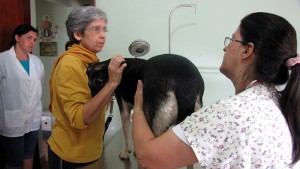 Following Skipper comes the shy Céu, a two-year old female dog with symptoms of vomit. After analyzing the blood test, the veterinarian determined that the data on liver functions is abnormal. As a result, Céu will have to take a daily dose of medicine for 15 days, following which a new test will be conducted. In the event that the problem does not improve, a referral will be made for an ultrasound of the liver. “Nine months ago a routine test indicated a problem in the liver, and now this result was repeated. I will follow the treatment that was recommended”, says Celeste, its caregiver.
Following Skipper comes the shy Céu, a two-year old female dog with symptoms of vomit. After analyzing the blood test, the veterinarian determined that the data on liver functions is abnormal. As a result, Céu will have to take a daily dose of medicine for 15 days, following which a new test will be conducted. In the event that the problem does not improve, a referral will be made for an ultrasound of the liver. “Nine months ago a routine test indicated a problem in the liver, and now this result was repeated. I will follow the treatment that was recommended”, says Celeste, its caregiver.
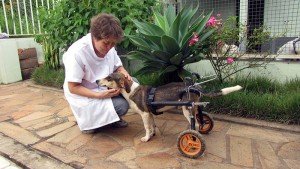 On a wheelchair, the little Tuim arrives to receive acupuncture. Its tutor is Maria José Soares, who takes care of a kennel with more than one hundred animals for the non-governmental organization Amigos dos Animais de Rua (Friends of Street animals) of Cambuquira, a town in the interior of the state of Minas Gerais, Brazil. The treatment with needles is designed to help the recovery of movement of the hind legs, lost after a car injury that took place a fortnight ago, when the wheelchair was required. Tuim still has some sensitivity in this area: is capable of making some slight movements and responds to some stimuli.
On a wheelchair, the little Tuim arrives to receive acupuncture. Its tutor is Maria José Soares, who takes care of a kennel with more than one hundred animals for the non-governmental organization Amigos dos Animais de Rua (Friends of Street animals) of Cambuquira, a town in the interior of the state of Minas Gerais, Brazil. The treatment with needles is designed to help the recovery of movement of the hind legs, lost after a car injury that took place a fortnight ago, when the wheelchair was required. Tuim still has some sensitivity in this area: is capable of making some slight movements and responds to some stimuli.
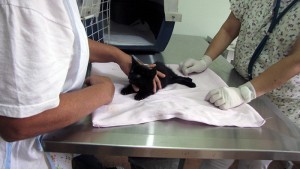 While the animal is being attended, the volunteers learn about several procedures and the correct application of medicines. Another treatment takes place in the assistance room in which a cat has been rescued from a car injury with fractures in the body. The medicine initially given in the first days of emergency was inadequate, and may have caused other problems. “It is important to consult someone who has scientific knowledge to receive the correct guidance”, explains the veterinarian Márcia Bacco to the group of volunteers.
While the animal is being attended, the volunteers learn about several procedures and the correct application of medicines. Another treatment takes place in the assistance room in which a cat has been rescued from a car injury with fractures in the body. The medicine initially given in the first days of emergency was inadequate, and may have caused other problems. “It is important to consult someone who has scientific knowledge to receive the correct guidance”, explains the veterinarian Márcia Bacco to the group of volunteers.
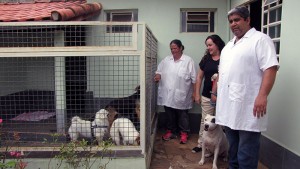 Tarcísio de Azevedo is a baker in the city of Três Corações, Minas Gerais, Brazil, who for two years has been working as a volunteer in the NGO Arca de Noé (Noah’s Ark). Twice a week he comes to Carmo da Cachoeira to participate in the course: “Here I have learned to take care of dogs in a correct manner. I used to think that I knew how to take care of them, but with the course when we take the course we realize that we did not know anything. I have learned to collect blood and detect some kinds of diseases”, he says. In his work at the NGO, Tarcísio performs many emergency rescues of animals. “The course has also taught me how to correctly manipulate injured animals”, he concludes.
Tarcísio de Azevedo is a baker in the city of Três Corações, Minas Gerais, Brazil, who for two years has been working as a volunteer in the NGO Arca de Noé (Noah’s Ark). Twice a week he comes to Carmo da Cachoeira to participate in the course: “Here I have learned to take care of dogs in a correct manner. I used to think that I knew how to take care of them, but with the course when we take the course we realize that we did not know anything. I have learned to collect blood and detect some kinds of diseases”, he says. In his work at the NGO, Tarcísio performs many emergency rescues of animals. “The course has also taught me how to correctly manipulate injured animals”, he concludes.
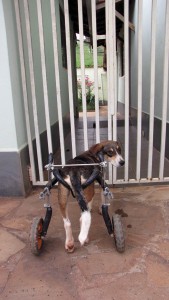 Marta Rosa is a worker at the city kennel of Três Corações and also participates in the same NGO. She benefits from the group events, bringing animals that need to be attended, and ends up learning new things. “My knowledge about diseases and medicines has increased with the learning here at House of Hope”.
Marta Rosa is a worker at the city kennel of Três Corações and also participates in the same NGO. She benefits from the group events, bringing animals that need to be attended, and ends up learning new things. “My knowledge about diseases and medicines has increased with the learning here at House of Hope”.
The NGO Arca de Noé has been familiar with the work of the House of Hope for four years. “We bring the animals and they are attended for free, even for castrations, which are very well done. The post-surgery recovery is very quick”, says the vice-president of ASPAN – Associação dos Protetores de Animais Arca de Noé from Três Corações, Márcia Ribeiro.
The course, which gathers together caregivers and volunteers from NGO’s, has takek place for seven months and has the additional benefit of promoting the exchange among the institutions. “We try to support those who are also helping the animals. We exchange experience and form a network of collaborators. In a situation of emergency, it is important to know with whom we can count, explains Tatiana Figueiredo, a volunteer at House Light on the Hill.






